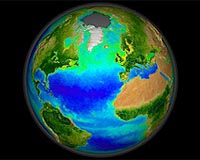| . |  |
. |
Paris (AFP) Aug 14, 2009 Developing countries will need billions to curb carbon pollution and cope with its consequences and who will foot the bill emerged as a major hurdle at UN climate talks that ended in Bonn on Friday. The five-day negotiating session made scant progress with only four months until the Copenhagen conference slated to deliver a planet-saving treaty, prompting the UN's climate chief to warn that time was running out. "If we continue at this rate we are not going to make it," Yvo de Boer, executive secretary of the UN Framework Convention on Climate Change (UNFCCC), said in a webcast press conference. The best that can be expected from the December meeting, said several delegates, is an "interim agreement" that lays out the basic framework of a post-Kyoto accord, with hard numbers to be filled over the course of 2010. The provisions of the Kyoto Protocol run out in 2012. Efforts this week to whittle down an unwieldy 200-page document into a draft treaty have been stymied by a deep rift between rich and poor nations. Disagreement over how deeply wealthy economies must slash their greenhouse gas emissions by 2020, and whether commitments by developing nations should be binding, have helped deadlock the process. The more than 180 nations engaged in talks cannot even agree on a procedure for drafting the text. "There really isn't a very strong climate of confidence," said France's climate ambassador, Brice Lalonde. But the most critical point of blockage today, say many participants, is money. "The fact that there are no proposals for financing on the table is preventing progress," said Jose Romero, a negotiator from Switzerland. "This is the big issue." The UN has estimated that, by 2020, the cost of mitigating and adapting to climate change will rise to 200 billion dollars and 100 billion dollars per year. On Friday, a bloc of least developed countries and small island states said rich nations should earmark one percent of GDP, some 400 billion dollars annually, to help poor countries cope. Top UN climate official de Boer has called for a first pledge in Copenhagen of 10 billion dollars, to help poor nations map out "solid strategies to limit the growth of their emissions." But even that figure has caused wealthy nations -- dealing with stalled economies and concerned about the money will be managed -- to balk. "So far, only less than one billion dollars has been made available to address urgent needs for adaptation," Dessima Williams, UN ambassador for Grenada said at a webcast press conference in Bonn, speaking on behalf of the Alliance of Small Island States. It is not just the amount that matters, but the framework, de Boer told AFP as the negotiating session got underway. "The thing that I find most worrying today is that there is little or no clarity on how financial resources are going to be mobilised to allow developing countries to engage," he said. With the UN process bogged down, several participants are quietly dialing down their expectations for Copenhagen, even if they say they remain optimistic in the long run. "The general impression is that in Copenhagen we are not going to have the complete and perfect accord," Lalonde told AFP. "We are moving toward the idea that we may wind up with a political accord, one that will continue to evolve." "The best likely outcome in Copenhagen may be an interim agreement nailing down the basic architecture," said Elliot Diringer, vice president of the Pew Center on Global Climate Change, a Washington-based think tank with close ties to the Obama administration. But if the crafting of a global treaty spills into 2010, it should not necessarily be seen as a setback. "Far from a failure, that would actually be a huge step forward," he said. Share This Article With Planet Earth
Related Links Climate Science News - Modeling, Mitigation Adaptation
 GeoEngineering Against Climate Change
GeoEngineering Against Climate ChangeMoffett Field CA (SPX) Aug 14, 2009 'Geoengineering' refers to human-made changes to the Earth's land, seas or atmosphere that are intended to help slow climate change. However, some scientists are worried that geoengineering techniques may cause more harm than good. Geoengineering techniques aim to slow global warming through the use of human-made changes to the Earth's land, seas or atmosphere. But new research shows that ... read more |
|
| The content herein, unless otherwise known to be public domain, are Copyright 1995-2009 - SpaceDaily. AFP and UPI Wire Stories are copyright Agence France-Presse and United Press International. ESA Portal Reports are copyright European Space Agency. All NASA sourced material is public domain. Additional copyrights may apply in whole or part to other bona fide parties. Advertising does not imply endorsement,agreement or approval of any opinions, statements or information provided by SpaceDaily on any Web page published or hosted by SpaceDaily. Privacy Statement |